Getting your music out there and earning from it – that’s what every musician and artist wants, right? And yet, it’s surprising how little artists know about the music publishing industry and how deeply it can affect their growth. This music publishing 101 guide is going to change that.
Granted, music publishing is a very wide field. We could be highly detailed and technical, but that would probably take up an entire book. Instead, we will skirt around the most important things start-up musicians should know about music publishing, including:
If all you know about music publishing is to sign up with the local Performance Rights Organization (PRO) and wait for the paychecks to start coming in, you have a lot to learn. While it’s bound to be a long read, remember that this guide could help you make more money from your music.
If your goal is something a little more comprehensive and detailed, we recommend Tom Petty’s book The Plain & Simple Guide to Music Publishing. The book is the ultimate handbook on the music business and the world of music publishing, and you may rely on it to help you navigate the industry at any stage of your career, whether as a beginner or professional musician.
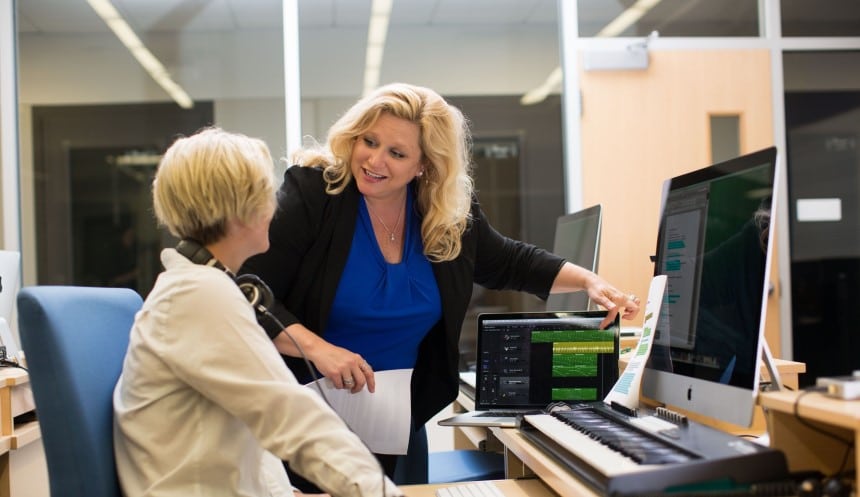 Music publishing is the infrastructure that exists to help composers get their musical works out to the public and make money from them through a system of copyrights, licensing, and supporting organizations. It’s just like publishing a book, but this time you need to work with a music publisher to get your music out there and the money in.
Music publishing is the infrastructure that exists to help composers get their musical works out to the public and make money from them through a system of copyrights, licensing, and supporting organizations. It’s just like publishing a book, but this time you need to work with a music publisher to get your music out there and the money in.
To begin with, music is a piece of intellectual property. It belongs to the composers who make a decision to commercialize that ownership to make money from it. However, since it’s almost impossible for individual musicians to keep track of all the ways their work is being used, a music publishing company steps in to help with copywriting, collecting royalties, and other ways of exploiting that ownership.
That’s simple enough to understand, but there’s a problem. If you own the music, by what right does the music publisher control the distribution and licensing of that music? What determines the share of revenue they will earn from that music? That brings in the more important question of music ownership and copyrights.
At the core of music publishing lies the fact that any song you create will exist in two forms: the composition and the sound recording, also known as a master. These two parts of the song have unique ownership rights, which is why you can have some people making covers of popular songs without violating copyright.
That is also how music publishers can have different rights to the same song without owning it outright. At the end of the day, music licensing is “leasing out” the music while retaining full ownership. Here’s how it happens.
The composition is the unique, underlying musical work at the heart of every song or musical work. This typically means the melody and lyrics because they are unique enough to be copyrightable pieces of intellectual property.
In other words, the composition is the most basic but distinct part of the music you create. Composition copyright has created the instance a distinct piece of music is recorded or written down, even if it were just a piece recorded on bass guitar.
The use of a composition for copyrighting can be traced back to the early days of music publishing when it was done using sheet music and sold in shops. The copyright for the composition is owned wholly by the songwriter and is created automatically the moment the music is written down or recorded.
In the case of multiple songwriters, you can share this copyright equally or based on each person’s contribution to the music. Ownership of the composition can get hairy, especially if there isn’t a written agreement by all the parties involved dictating the terms of ownership.
Copyright gives the owner legal rights to make copies of the work, create new works based on it, distribute copies of the work (and earn from them), perform the work, display it, and sell this right to others. You can see that the world of copyrights can get complicated quite easily, but let’s discuss the master copyright for now.
For purposes of music distribution and licensing, there is a second form of copyright called the master. The master recording is a derivative of the composition, a fixed recorded version of the composition that can then be copyrighted as its own unique piece of intellectual property. Master recordings are usually marked with the symbol ℗.
For example, Adele’s album 21 is signed to XL Records. That means every time a song such as Someone Like You is played, XL Records gets a share of the money due to their copyright on the album’s master, but Adele and her co-writer Dan Wilson (formerly of Semisonic) also get a share because of their composition copyright.
However, if someone does a cover of Someone Like You, that is a different derivative of the original composition. That means XL Records won’t get paid for it, but Adele, Dan, and their publishers will.
Copyrights on the master are about the recording, not the song itself. Ownership of the master recording is usually straightforward because it is owned by whoever paid for it. This could be the artist themselves or the recording label to whom they are signed. With this copyright, the owner of the master copyright can make money by making copies of the master and selling it via vinyl, streaming, downloads, among others.
What this means is that, technically, the producing studio doesn’t own the master. Instead, they will be given a certain percentage of the master, something between 1%-20%. Thus, they do get a share of the revenue generated from the record. Given the often complicated world of revenue sharing in music publishing, the most important piece of advice you can get is to always put things in writing. You should embrace being that person who’s always whipping out contracts and getting people to sign because that could save you countless headaches and dollars down the line.
More importantly, never assume anything. Just because you paid to have your music published doesn’t mean that you automatically own the master. Make sure that you have that uncomfortable conversation with your colleagues, publisher, producer, studio, or other entity and clear everything up before the money starts coming in.
Once you’re got your music ownership down on paper, the next step is to put it into action to earn money. This usually comes in the form of publishing royalties generated from the use of that piece of music.
Third-parties have to get a license from the copyright owner whenever they want to reproduce, distribute, perform, display, or create derivative works based on the original. Thus, the copyright owner gets compensation in the form of royalties.
Since there are different forms in which music is published and distributed, there are also different types of publishing royalties.
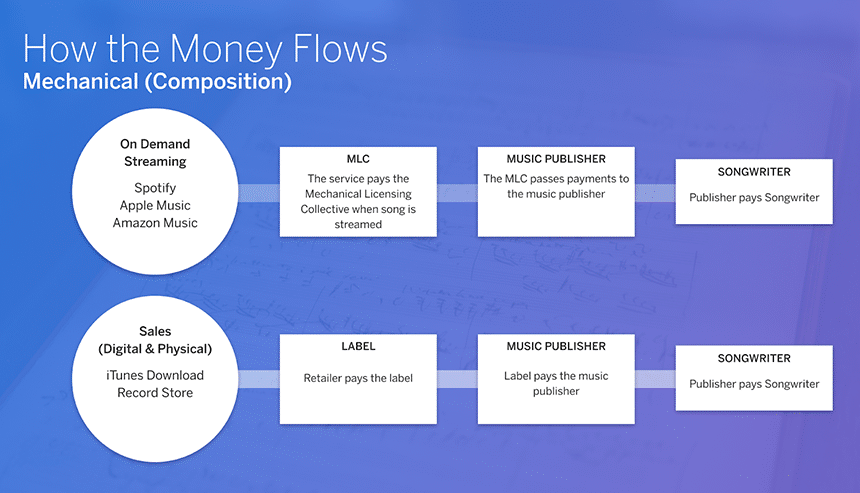 Mechanical royalties come from those who want to reproduce the composition. In other words, mechanicals comes from the sale of a copy of the song regardless of the medium through which it is achieved, which includes streaming and downloading sites.
Mechanical royalties come from those who want to reproduce the composition. In other words, mechanicals comes from the sale of a copy of the song regardless of the medium through which it is achieved, which includes streaming and downloading sites.
Back in the early days, reproducing a song meant mechanically reproducing the medium in which it came. This is where the term mechanical royalties come from, and it still refers to all forms of payment for digital or physical copies.
Mechanical royalties make up the biggest source of revenue for songwriters and publishers alike. They arise from the composition copyright and the use of that copyright to reproduce music in various forms. In this digital age, mechanical royalties mostly come from streaming sites such as Pandora, Apple Music, Spotify, iTunes, Amazon, and physical record shops.
Mechanical royalties’ organizations such as the Harry Fox Agency (HFA) in the US and the Music Copyright Protection Society (MCPS) in the UK are responsible for distributing these monies directly to the publishers and songwriters.
Any artist, label, or production company that wants to use some part of your music will pay fees to the relevant organization as dictated by the Copyright Royalty Board (CRB). The CRB is a panel of three judges that sets the rates on mechanical royalty fees depending on the medium used to record that song.
These judges sit every five years and take input from songwriters, music publishers, record labels, and digital media companies before making a judgment designed to favor everybody. In short, these terms are:
These royalties vary based on whether they involve interactive streaming services or physical reproduction media.
Streaming services have to apply three formulas based on revenue generated and subscribers and apply whichever is greater. These royalties are combined with public performance royalties, but in general, the mechanicals for streaming is about $0.06 for every 100 streams.
The royalties for media distributed in the traditional sense via physical records remain at the rate of 9.1 cents per song. In most cases, these royalties are paid by the owners of the master copyright (such as the record label) to the songwriters.
The biggest share of this type of mechanical royalties is generated from music downloads. Platforms like Spotify pay the royalties on a per-unit basis to the PRO responsible for collecting the money on behalf of publishers and songwriters. These are then calculated as part of the All-In Royalty Pool and paid in proportion to each songwriter’s share of the composition copyright.
In general, mechanical royalties only benefit the most prolific musicians. With payments of just a few cents per download, only the most popular musicians get to make significant earnings in this manner. Artists may hate streaming services for this, but it is very likely that streaming saved the future of music Trusted Source Streaming Saved Music. Artists Hate It. Many musicians aren’t sharing in streaming riches. Can digital music economics change to benefit everyone? www.nytimes.com .
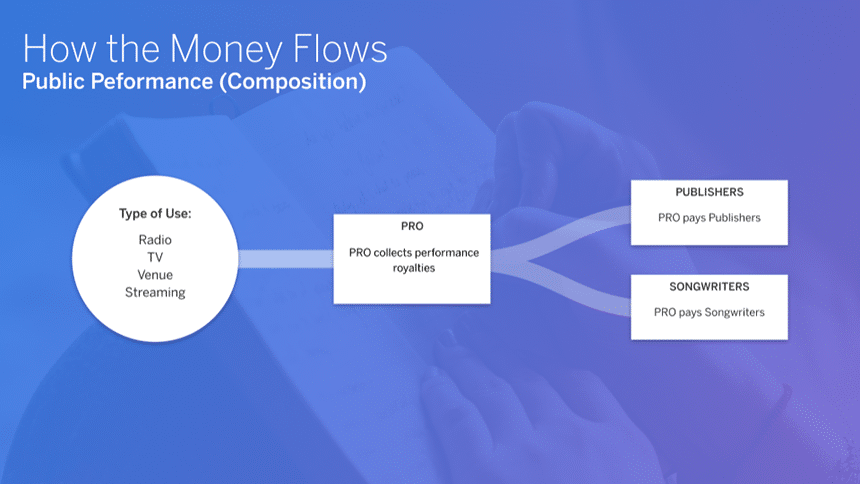 Public performance royalties are paid to composition owners for the right to perform or display a musical work publicly. In this sense, even playing a song on the radio, in a restaurant, or streaming on a service like Spotify is also considered a public performance.
Public performance royalties are paid to composition owners for the right to perform or display a musical work publicly. In this sense, even playing a song on the radio, in a restaurant, or streaming on a service like Spotify is also considered a public performance.
Public performance royalties are closely related to mechanicals, especially regarding interactive digital platforms such as Spotify. Every time a user chooses to play a particular song, it triggers a process that ends up with the songwriter and their publisher getting paid for that performance.
The record companies, digital streaming companies, and other distributors pay these royalties directly to performing rights organizations such as ASCAP, BMI, or SESAC in the US and PRS and PPL in the UK. These organizations then distribute these rights to the songwriters as necessary.
Users who require the music for public performance, such as DJ’s, restaurants, and radio stations, pay their royalties through license fees. They first have to acquire what is called a blanket license from the PRO concerned, which allows them to play any music they want depending on their audience.
However, these users do submit copies of their cue sheets, broadcast logs, and other records to help the PROs identify which songwriters will get paid. A lot more data is used to determine the amount dues paid to songwriters, including the scope of the audience reached by the performance and time.
Some songs are so closely tied to blockbuster films that they probably wouldn’t be as big without the film. Think of Charlie Puth’s See You Again or even Whitney Houston’s version of I Will Always Love You, which was recorded for The Bodyguard. This kind of music earns its writers and publishers money through synchronization fees.
Synchronization licensing is different from the other types because of its unique applications. The licensing targets a specific derivative of the music often recorded, especially for the film or movie. It doesn’t require the song or the artist to be very famous, but it does play very well once your track is selected, depending on the expected audience.
More importantly, sync licenses are usually negotiated directly between the users and the music owners or their representatives. There are no PROs involved, so the cash flow is paid directly to the recording, publishing, and songwriting parties.
Sync fees aren’t generated by popular movies only, though. Anyone who wants to use the soundtrack in any visual medium, including adverts, TV shows, or any other production. Even influencers using copyrighted music Trusted Source Lumanu Blog - What Influencers Need to Know About Royalty Free Music Every creator wants to produce better content. If you’re serious about becoming an influencer, you simply don’t have any other option. www.lumanu.com on sponsored posts need to pay sync royalties for their use.
Sync royalties are interesting for several reasons. They are the new type of remuneration for artists, which has gained significant traction in the recent past. It rewards both songwriters and recording artists equally, and it is even reliant on the mainstream performance of the song to command large fees.
This informal environment makes sync licensing a very attractive source of income for upcoming and struggling musicians. In addition, the music will have an additional platform from which it has the potential to grow wildly popular, just like See You Again.
The market for synchronization licensing is growing at a healthy, steady rate as video content continues to grow. Thanks to platforms such as Netflix, more films and commercials are being created every day. This makes sync licensing one of the most promising ways for artists to make money even when they are just self-promoting.
Something as simple as a MIDI controller such as this Arturia Keylab 49 Essentials Keyboard can get you in business quickly. This particular keyboard is a fan favorite due to its butter-smooth keys, and the included Analog Lab 3 software. Analog Lab 3 comes with more than 5500 presets, making it the ideal plug-and-play MIDI controller keyboard.
If you’re on the market for a new MIDI controller, we have also spent some time assessing the best MIDI controllers here. Read the review to find out some of the latest and best controllers you can buy to help you gain an edge in your composing and recording work.
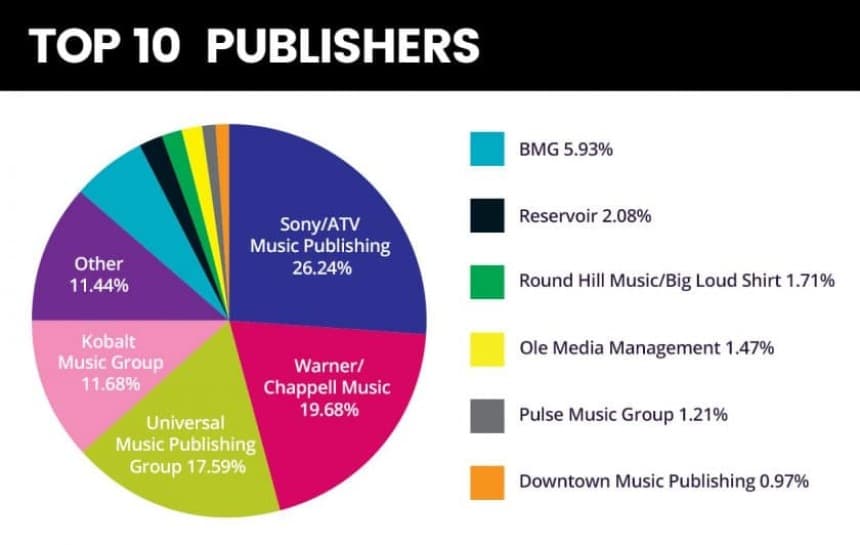 So far, we have seen how songwriters and publisher’s split royalties on what is essentially a 50-50 basis. What exactly do music publishers do that gives them the right to earn that much share of publishing copyright off the backs of musicians? More importantly, do struggling musicians really need a publisher?
So far, we have seen how songwriters and publisher’s split royalties on what is essentially a 50-50 basis. What exactly do music publishers do that gives them the right to earn that much share of publishing copyright off the backs of musicians? More importantly, do struggling musicians really need a publisher?
To start with, a music publisher is a third-party company or agency that partners with musicians to get their musical works published and properly managed. That means registering and managing the different licenses, collecting royalties, promoting the musical work, and generally helping the musician grow as far as they can.
Music publishers can be as small as a one-person agency to large, independent firms representing the world’s top musicians – think boutique firms such as Warner Chappel, Universal Music Group, and Sony Music Group.
Before the 1960s, when music distribution was still relatively simple, music publishers were mainly responsible for printing sheet music. New York’s Tin Pan Alley is widely considered to be the birthplace of modern music publishing, but a lot has changed since then.
In addition to managing music in all the various channels it can be distributed, publishers have experts who work on everything from the legal side of things to talent developers and trainers. They also have the job of maintaining solid relationships with other entities involved with the music publishing industry on behalf of their clients.
The core duties of a music publisher are licensing and administration of the music’s copyright. They are the legal go-between for the musician who will negotiate with potential users of the music and collect fees on their behalf.
Whether the license in question is a mechanical, public performance, or sync license, the publisher has the right to grant or deny rights to others. In doing so, they also ensure that the songwriters get paid for their efforts. They collect fees and royalties on your behalf, ensuring that all you need to do is continue making great music as you wait for your paycheck.
In general, music publishers have a vested interest in the success of the musician because they earn more if the music brings in more money. Thus, they almost always invest heavily in the creative side of the industry to help with the career development of the musicians under them.
This part of the job often involves finding other songwriters and artists to create useful collaborations, continuously improving and growing the talent under their control. They will also create song demos for new songs to fuel creativity and productivity.
Music publishers are constantly on the lookout for opportunities to make more money. That’s why most will have dedicated personnel whose job is to find new exciting opportunities such as sync licensing to bring in more revenue.
The legal side of music publishing is, of course, very complex. Managing music rights alone and licenses is difficult, but so is ensuring that all contracts, transactions, and other issues are concerned with music rights.
Music publishers or labels hire skilled, experienced personnel to help musicians maintain ownership of the most valuable parts of their music works without nasty problems such as copyright infringement.
Besides, thanks to modern technology, the publishing companies also track and monitor common media to ensure that infringement of copyright theft occurs.
Another fundamental role of a music publisher in music promotion. They are responsible for ensuring new music is released on the right platforms and channels, as well as being strategically placed in radio or TV primetime, social media, and other platforms.
Similar to publishing a book, music publishers work hard to bring your music out into the public and commercialize it. The most powerful brands, such as Sony Music, can get a great song globally within hours or days.
So far, we have explored what music publishers do in a general sort of way. However, the role your publisher plays in your music will depend on what kind of deal you sign with them.
There are different types of music publishers and different types of deals they can offer. The three basic elements of music publishing, however, still remain:
If you look at publishing deals this way, you can conclude that any third-party agreement to promote your music for you technically qualify as a publishing deal. There are up to 8 types of these deals, but we will only cover the most common ones.
The traditional publishing deal also called a co-publishing agreement (for multiple songwriters and one publisher), is where the songwriters grant the publisher the full 50% of publishing rights in return for services provided. You still get to keep the full songwriter’s share, which amounts to 75/100 of the total publishing royalties.
Traditional music publishing deals typically last for 1-3 years at a time and give the publisher significant control over how to promote, license, and otherwise exploit market opportunities to bring in more revenue. The share in publishing royalties gives the publisher a lot of incentive to promote and support your musical works to bring in more revenue.
For most musicians, the simplicity of the traditional publishing deal and the little ongoing effort required on the part of the songwriters make it an attractive deal. Publishers who give them also tend to offer cash advances as a signing bonus to be recouped when royalties come in, which also adds to the allure of this kind of deal.
However, the traditional or co-publishing deal is available to established musicians and prolific composers. It might also require previous industry experience to convince the publisher to give you such a deal.
When it does happen, you will be required to register all your songs with the publisher for the given period as well. There are special “Single Song Agreements” based on this model applicable to those who want to take things slow or by signing only pre-existing songs.
Due to this, traditional deals are not often used when the artist has also signed a recording deal with a different label.
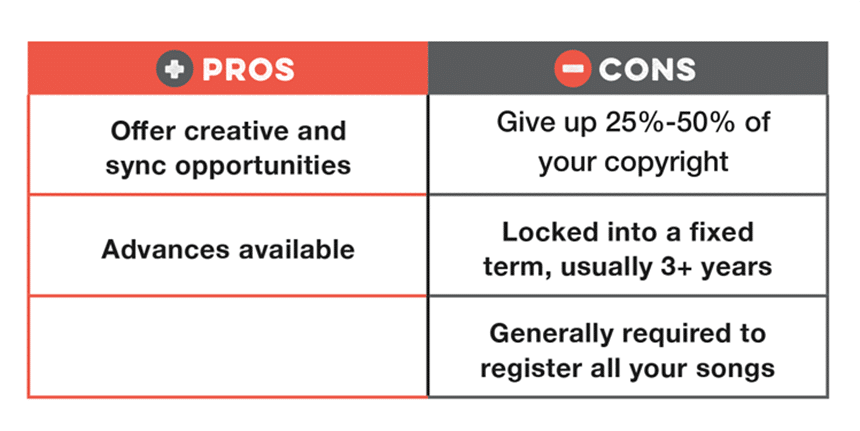 2. Administration Agreement
2. Administration AgreementAn administration music publishing deal is where the songwriter only wants minimal services from the third party, including the registration and licensing paperwork and collecting royalties. The songwriter parts with less money for this agreement and retains control over their song, but they have to self-promoter.
Administration deals often only involve only a 10-20% share of the publishing income, but the songwriter will have to register several songs or albums as part of the deal. Administration publishing deals will last between 3-5 years.
Administration agreements are especially attractive to upcoming and independent songwriters because it gives them an extensive reach to collect royalties without paying too much of the income to the publisher.
However, that also means that songwriters have to handle all the creative work in an administration publishing deal. That includes promoting the songs, exploring opportunities for more revenue, and creating beneficial industry networks. A well-known example of an agency that specializes in these deals is Bug Music in LA.
This is in addition to the burden of consistently producing high-quality music from what could very well be bedroom studios. If you are currently operating from such a place, the future is bright for you. Just be sure to take some care of your acoustics with products such as these fantastic microphone isolation shields we reviewed.
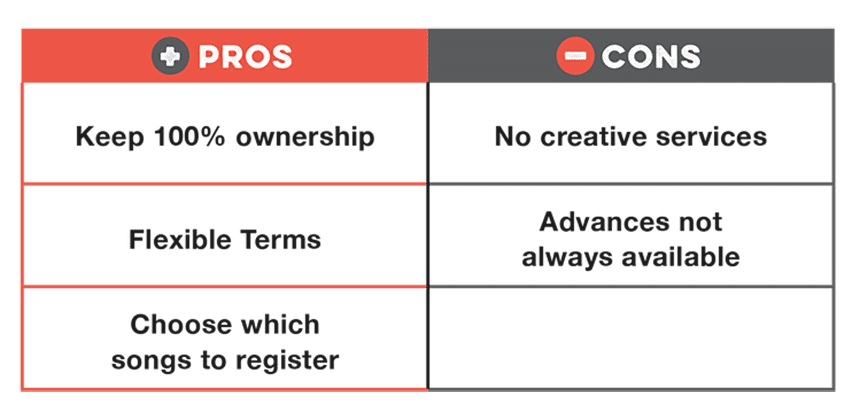 3. Music Placement Deals
3. Music Placement DealsThese are the opposite of administration deals where the owners only need promotion and marketing services for their music without any kind of administrative functions.
In this scenario, you as a songwriter need a company with the right connections in the industry to get your music on films, ads, popular TV shows, and other opportunities. You don’t need to transfer any copyright in this deal, but the placement company will likely want a share of the revenue resulting from their placement efforts. That could be 25%-50% in a deal lasting for about three years and covering multiple musical works for maximum effectiveness.
This is a type of agreement where a company, not necessarily a publisher, approaches a songwriter to create a composition for use in their projects which they purchase outright. That means no future royalties will flow from the deal because the songwriter essentially signs away the composition and master rights for good.
While these kinds of deals may look good to struggling musicians, they are dangerous and may even end up in the owner has no attribution. They offer quick money but can lead to long-term regrets if they are not approached carefully.
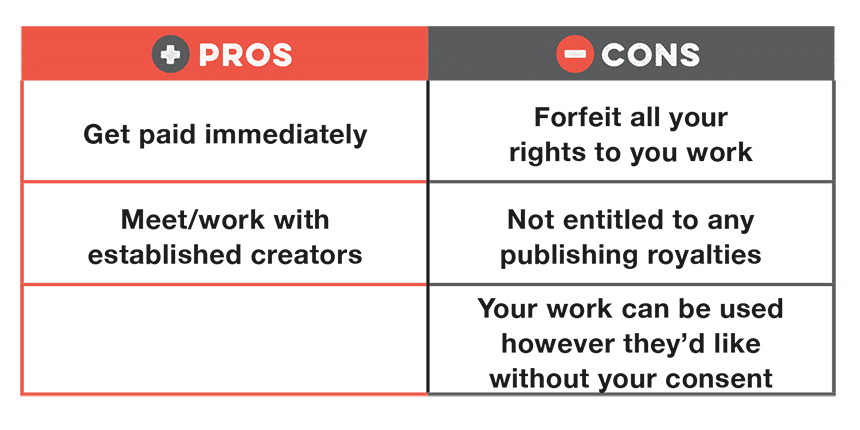 5. Sub-Publishing Deals
5. Sub-Publishing DealsSub-publishing deals are one where a songwriter wishes to collect royalties in foreign countries. To do this, the songwriter or their publisher will often approach another publisher in the foreign country and have them collect on their behalf, take a cut, and submit the rest.
Sub-publishing deals are often necessary because only local publishers have jurisdiction to collect royalties in some countries. If these royalties are not collected, the publishers simply keep it as a kind of “black box money.”
At this point, it is appropriate to cover a little more about the songwriters and publisher’s share. We have already seen that the copyrights to any song are divided into two equal parts. The author’s share is a guaranteed 50%, shared between colleagues if it was co-authored. The other 50% is the publisher’s share.
You will also see some people referring to the writer’s share as 100% and the publisher’s share as the other 100%, giving the song a total of 200%. That’s the same thing on paper, but it comes a little complicated in practice.
The writer’s share earns half the public performance royalties, while the other half goes to the publisher. In the case of multiple authors, the writer’s share will be distributed to them based on a pre-arranged formula without affecting the publisher’s share.
There are organizations that have oversight over collecting and paying out writer’s dues. These are the performing rights organizations (PROs) and collective management organizations (CMOs).
As a songwriter, you need to be affiliated with one of these organizations in your country. The organization will be responsible for collecting the various royalty payments and paying them directly to you. The best organizations will even collect global royalties for you, meaning that you will be able to receive 100% of your writer’s share from one organization to simplify things.
When a piece of music comes into existence, the authors own full rights to the composition. That includes publishing rights until they decide to sign a publishing deal with a third party. Independent songwriters don’t automatically receive the publisher’s share, however, unless they sign up as such or create their own publishing entity.
As a songwriter, there are many advantages to joining a publishing company. For one, it takes away a lot of the administrative workload associated with registering and managing your song’s copyrights and licensing.
You also get to take advantage of your publisher’s often extensive industry networks to get your song promoted and gain access to unique opportunities. Plus, publishers often have invaluable in-house resources, including songwriters, singers, and even recording studios.
Plus, joining a publisher means you can collect your share of exclusive publisher’s royalties such as mechanicals.
The split of the publisher’s share is usually 100% (or half the song) unless a contractual agreement between the writer and publisher says otherwise. The publisher collects the same share as the writer’s share of publishing royalties. Given the different types of royalties, this means:
Publishers collect money from thousands of sources, including representative organizations such as PROs as well as streaming services, broadcasters, bars, and more. If there are any dues meant to be paid to the writers, the publisher submits these to the relevant organization for distribution and monitoring.
Yes, you do need a music publisher if you expect to have any kind of success in the music industry. The intricacies of music copyrighting, collecting royalties, and managing licensing can prove too challenging for the average Joe. However, music publishers have extensive resources and expertise to do this easily at only a fraction of the profits they will make for you. With that in mind, it makes sense to get a trusted publisher on board long before you gain fame and success.
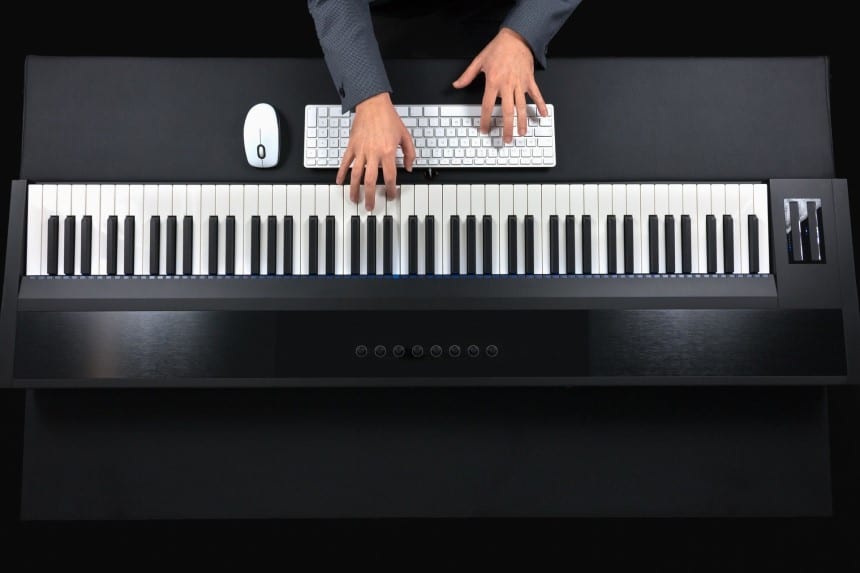 Yes, you can register as an independent songwriter or even set up your own publishing body if you’re not willing to go through conventional publishers. In this scenario, you hold all the rights, publisher’s share, and songwriter’s share. Thus, you also get full copyrights. However, this may not be an advisable strategy, even if you don’t expect to be very successful in the industry.
Yes, you can register as an independent songwriter or even set up your own publishing body if you’re not willing to go through conventional publishers. In this scenario, you hold all the rights, publisher’s share, and songwriter’s share. Thus, you also get full copyrights. However, this may not be an advisable strategy, even if you don’t expect to be very successful in the industry.
The music publishing deal you sign with the music publisher will determine the revenue sharing split. The traditional publishing deal typically gives the publisher 50% of the publishing rights, which is reflected in the revenue they earn. You can opt for deals where they do less, such as administrator deals, but these simply leave you dead.
Publishing rights are the legal framework that determines the ownership of musical works, just like other pieces of intellectual property. Songs usually have two types of publishing rights, namely composition rights attributed to the songwriters and master rights attributed to the parent company.
These rights are shared between the songwriters and publishers on a 50/50 or 100/100 model. Both publishing rights earn specific types of royalties, which are split as dictated by law depending on the share of each of these entities.
A music publisher is involved in the management of musical works and their associated copyrights to generate income. Music production is the actual recording of songs onto digital or physical media for sale. Music producers are in a different area of the music industry where they earn their money through commission or fee-based arrangements.
Recording labels to which a musician may be signed have a very different job to play in the publishing industry. They are responsible for generating copyrightable master copies of musical works that can then be sold and earn the publisher’s and owner’s money.
However, recording labels or studios only own that particular version of the song as published. All other iterations, including covers and other formats, fall outside their authority.
On the other hand, music publishers often deal with the full portfolio of musical works by a certain songwriter. They control licensing and publishing rights even for derivatives of the particular musical work.
There are three major PROs here in the US: BMI, ASCAP, and SESAC. Of these three, the non-profit organization called BMI is easily the most popular because of its free signup, prompt payment of royalties, and extensive reach both in the US and the rest of the world.
ASCAP is the second-largest publishing organization in the US that represents over 600,000 songwriters and 11 million compositions. Despite being a premium subscription service, ASCAP is highly popular because its fringe benefits include discounts on various musical programs, membership to the US Alliance Federal Credit Union, among others.
SESAC is a for-profit organization that has been in existence since 1930. It represents clients by invitation only, making it an exclusive club of successful composers. It does offer premium and personalized services, which gives it an edge over the other two. To answer the question, you should first register with SESAC or BMI, depending on which one is nearest to you, and get working.
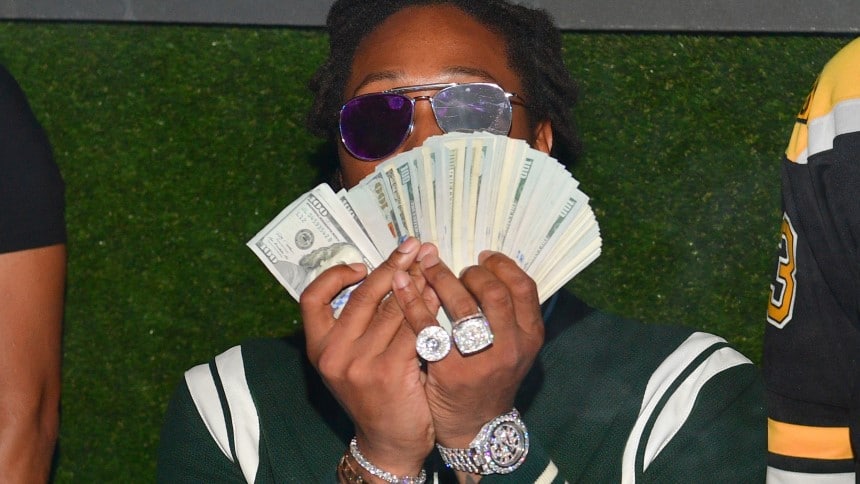 Thanks to organizations like BMI and SESAC, any songwriter can receive compensation in the form of royalties for their work. You only need to register with the relevant organization and follow its rules before you can get your first paycheck.
Thanks to organizations like BMI and SESAC, any songwriter can receive compensation in the form of royalties for their work. You only need to register with the relevant organization and follow its rules before you can get your first paycheck.
More importantly, join a publishing company so that you can get professional help on how you can market and promote your songs so that they become more popular and earn more money.
You should know that PROs like ASCAP and BMI do not collect ad revenue from sites like YouTube. Instead, most artists receive compensation from the platform through YouTube’s Partner program. That way, they get paid directly from the ad revenue generated on their channels and when their songs are used in videos displayed on the platform.
In the same way, you should look into joining the YouTube partner program and earn from your content in the same way. What makes YouTube more important for artists is that it gives them a platform to grow and become popular at no cost and with only minimal self-promotion required.
While platforms like YouTube, Facebook, and TikTok are very keen on copyright laws, they often lack the capacity to follow up on every single piece of media posted on their platforms. It’s up to individual artists and their publishers to spot copyright infringement and take legal action against it either through banning, lawsuits, and settlements.
These copyright infringement laws are even stricter on commercial media such as films, ads, and broadcasts. If you like posting copyrighted media on social media, you can get legal action taken against you by the owners unless you have express permission and license.
Royalty-free music comes under a type of blanket license that makes it easier for users of proprietary music to purchase usage rights via affordable, one-off payments. This makes the process of licensing music easy, affordable, and flexible enough to open up the market and help composers earn more from their creations.
Just like YouTube, a royalty-free platform such as Stock Music opens up your potential audience. It also means that your songs could be used in big, lucrative projects such as regional ads and featured shows on TVs. In this way, royalty-free music is very important both to the creators and the users alike.
Why should you lose money out of ignorance of the basics of music publishing? While it’s true the details can get fuzzy really quickly, simply understanding the details can help you ensure that you never have to leave money on the table. Yes, it’s true that a lot of money goes unclaimed every year from PROs and CMOs, so they simply keep it.
This music publishing 101 is meant to be an introductory guide to help upcoming musicians get a handle on the business side of music. However, we do highly recommend that you at least talk to a professional in the industry before you make decisions that could potentially change your life forever. After all, why make great music if it will never reach the ears it’s meant to reach?